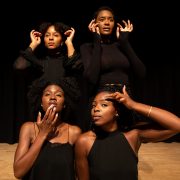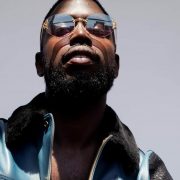Queens of Sheba: The Play Exploring the Black Female Lived Experience

This week, the award winning “Queens of Sheba”, presented by Nouveau Riché [@infonvrch] and Omnibus Theatre [@omnibustheatre], is making a return to the stage. The play will be going on a 10 venue national UK tour from 26th September – 29 November. I spoke to director Jessica Kaliisa about Queens of Sheba, and why it’s a must see for all audiences.
Could you please introduce yourself, and how you came to collaborate with Nouveau Riche?
“My name is Jessica Kaliisa, I am a theatre director but I studied journalism at university. For my dissertation, we could write about/produce a documentary on anything we wanted. So I did a documentary about misogynoir, which basically talked about the prejudice which is specifically targeted towards black women, and how black women are faced with racism and sexism at the same time. After doing that, I remember watching a play by Nouveau Riche called Timbuktu, and it was about four black men and their experiences of being a black man in today’s society. It was really good – so I approached Ryan Calais after and I said this is amazing, it’d be great to see one from the perspective of black women too. He was interested so I sent over my research, and my ideas and he loved it.
The experiences of a black woman are unique to a black woman, so we asked my best friend Jessica Hagan to write some spoken word around the topic. He really loved it, so to get more insight, experiences and stories we set up two focus groups, where about 20 women sat and spoke for hours and hours about their stories and experiences. It was amazing because some things were so different, and some things were so similiar. It was so surprising to see how many similiar things we’ve gone through.
After that, Ryan gave all the research to Jessica Hagan, and she wrote up an extended spoken word poem around all the stories we had discussed. We then structured it into a play, and now we have Queens of Sheba.”

How would you describe Queens of Sheba, and the themes of the play?
“The play is very dynamic. Very, very funny but also very honest and raw. The play follows four black women, and it’s loosely based around the event that happened at the DSTRKT nightclub in 2015, where four black women were turned away because they were deemed ‘too fat’ and ‘too dark’. It follows the journey of four women getting ready to go out on a night out, but also showing how black women simply are. We’re silly, we’re funny, we’re light. We’re not always angry, or serious, or any of those negative stereotypes. We’re just people.
Queens of Sheba really captures that well. It shows us in our natural life. It talks about so many different issues: going on dates, what happens in the work place, what happens when we’re getting chirpsed by guys. All of these experience not only relate to black women, but all women as well. It takes you through this lived journey in a very humorous, and poetic way. It also shows what happens when we are faced with prejudice, sexism and racism. It explores what happens when we are rejected solely for what we look like.”
In your press release it mentions you incorporate spoken word, physical theatre, dance and music from the African Diaspora, what was the thought process behind these choices?
“I think it’s something that people are able to relate to when seen on the stage. Particularly in a place such as the theatre. Ticket prices are through the roof, a lot of young people aren’t able to experience the theatre. It is deemed a privilege. Even if they had access they may not engage entirely because they don’t see themselves on stage, the stories may not relate to them.
However, we do have our stories and we have our ways of telling them. I think particularly people from the African diaspora are very expressive artistically: we love music, we love dance, we love art. It’s in our nature, our culture. It’s something that’s passed down from our ancestors. Music especially is something that is a huge part of African culture. So in order to bring those sorts of stories to life, the music is vital. The music that we use in the show are actually from our parents, the old classics. Aretha Franklin, Etta James – they’re old school black female artists. I believe those songs are included because black women actually have something different to say in their music. They speak from a place of truth through their experience. That was their art, drawn from their experience.”

Why is depicting experiences of sexism and racism so important in today’s context? And what does this mean for you personally?
“Representation is always important. It shapes us. Narratives shape individuals and society. It becomes our reality. For example, if we are constantly told that black men are thugs, that becomes the narrative. It becomes the way they are portrayed. Eventually, society starts to believe it. What starts to happen in turn is that people start placing those prejudices upon all black men. Then black men become locked into that negative stereotype, and they are physically treated according to these stereotype – resulting in oppression and abuse. That’s just one example of the negative effects of stereotypes, and forms of representation.
For me it’s so important that people are represented truthfully, as that’s what shapes narratives. Whether you’re black, white, asian, a woman or a man – they are still valid, and we need to get to place in society where we love and accept one another because no human should be treated any less because of the way they look.
I think as powerful as negative representation is, positive and truthful representation is the thing that will overshadow that.”

What are the long term aspirations for Queens of Sheba?
“We would love to take to New York! Or even producing it for TV would be a dream. I think there will always be a future for it because it is such a relatable play. It’s something that would keep being relevant until it isn’t.”
Check out Queens of Sheba, and get your tickets here: https://www.omnibus-clapham.org/queens-of-sheba-on-tour/





![ZINO VINCI’S ‘FILTHY & DISGUSTING’EP BRINGS YOU TO THE CORE OF THE ARTIST [@ZinoVinci]](https://guap.co/wp-content/uploads/2023/10/Zino-4.jpg)





![Remel London’s [@Remel_London] “Mainstream” is a must attend for upcoming presenters!](https://guap.co/wp-content/uploads/2017/02/REMEL-LONDON-FLYER-FINAL-YELLOW-COMPLETE-1.png)